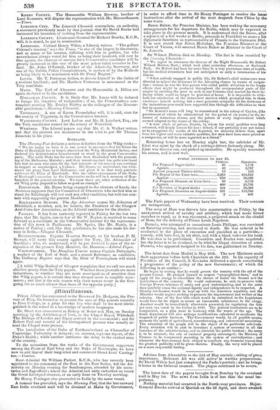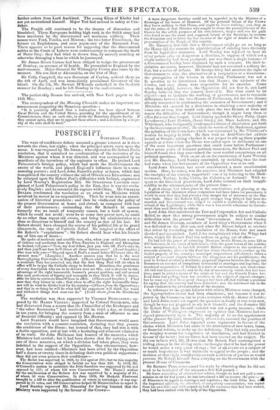gelistellanrous.
Prince Albert has announced to the Reverend Dr. Hodgson, the Pro- vost of Eton, his intention to present the sum of fifty pounds annually to Eton College, as a prize for that boy who shall be the most distin- guished in the school in a knowledge of modern languages.
Dr. Short was consecrated as Bishop of Sodor and Man, on Sunday morning, by the Archbishop of York, in the Chapel Royal, Whitehall. The Bishops of London and Ripon assisted in the ceremonial ; and Sir Robert Peel and several of the distinguished persons who usually at- tend the Chapel were present.
The installation of the Duke of Northumberland as Chancellor of Cambridge University is delayed ; on account, says one report, of the Duke's health ; while another attributes the delay to the excited state of the country.
To the secessions frqm the ranks of the Government supporters among the Peers of Earl Grey and the Duke of Roxburghe, we have now to add that of their long-tried and consistent friend Lord Carring- ton.—Courier.
Rear-Admiral Sir William Parker, K.C.B., who has recently been appointed to the command of the fleet in the East Indies, left the Ad- miralty on Monday evening for Southampton, attended by his secre- taries and flag-officer ; where the Admiral and suite embarked on hoard tlaa Great Liverpool steamer, at an early hour on Tuesday morning.
Sir Henry Pottinger also proceeded to India by the same vessel.
A rumour has prevailed, says the Morning Post, that the last outward East India overland mail will be detained at Malta by Government,
in order to afford time to Sir Henry Pottinger to receive the latest instructions after the arrival of the next despatch from China by the same route.
Baron Bulow, the Prussian Minister, has been making the necessary arrangements for his departure for Berlin, which may be expected to take place in the present month. ft is understood that the Baron, after a sojourn of a few weeks at Berlin, proceeds to Frankfort to assume hie diplomatic functions as representative of Prussia to the Germanic Diet. It is now stated that Baron Maltzhan, the Prussian Minister at the Court of Vienna, will succeed Baron Bulow as Minister to the Court of St. James's.
Sir Wilmot Horton died on Monday. The fact is thus recorded by the Morning Chronicle- " We regret to announce the decease of the Right Honourable Sir Robert Wilmot Horton, Bart. which took place yesterday afternoon, at Sudbrook Park. Sir Robert had for some time in a very precarious state of health, but his medical attendants had not anticipated so early a termination of his illness.
" When actively engaged in public life, Sir Robert's chief endeavours were directed to relieve the distresses of the labouring classes by means of emigra- tion : indeed, he was the first person who called public attention to the happy
effects that might be produced throughout the overpopulated parts of the empire by enabling the poor to seek in our Colonies that market for their in-
dustry which could no longer be provided at home. It is impossible to with- hold our admiration of the benevolent motives which prompted him to those exertions: indeed, nothing but a most generous sympathy for the distresses of the industrious poor could have supported him through the difficulties he then had to encounter.
" Sir Robert's name will long be remembered in the colony of Ceylon, (the government of which he administered for the period of six years,) as the re- former of numerous abuses, and the patron of every improvement which seemed adapted to the wants of the colony. "A wide circle of private friends, by whom his social qualities were long esteemed, will deeply lament his loss : indeed, if our partiality does not induce us to exaggerate the merits of the departed, we sincerely believe that, apart from his higher and more valuable qualities, few men have been more prized as a companion, or will be more regretted as a friend."
Returning home late on Monday night last, the cabriolet of Mr. Liszt was upset by the shock of a carriage driven furiously along. Mr. Liszt was thrown out, and picked up insensible. He speedily recovered his senses, and is now well.
PUBLIC PETITIONS TO
Petitions. MAY 25.
Signatures.
For Proposed Sugar-duties 23 1,718 Against. 43 2,767 Against proposed Timber-duties 13 553 For Repeal of the Corn-laws 2,264 624,623 Against 650 36,026
For Proposed Measure on Corn-laws
30 6,753 Against 400 25,766 For Revision of Import-duties 104 39,368 For Proposed Measures on Import-duties 531 119,760 Against 2 406
The Paris papers of Wednesday have been received. Their contents are unimportant.
The town of Ham was thrown into consternation on Friday, by the unexpected arrival of cavalry and artillery, which had made forced marches to repel, as it was rumoured, a projected attack on the citadel of Ham, for the delivery of Prince Louis Napoleon.
Darmes, who attempted to assassinate Louis Philippe, was convicted on Saturday evening, and sentenced to death. He was ordered to be conducted to the place of execution and punished as a parricide,— namely, with bare feet, in his shirt, and with a black veil over his head. He was then to be guillotined. Considere and Duclos were acquitted ; but the latter is to be detained, to be tried for illegal detention of arms. Darmes, who appeared resigned to his fate, was guillotined on Monday.
The latest date from Madrid is May 26th. The new Ministers made their appearance before both Chambers on the 22d. In his capacity of President of the Council, S. Gonzales delivered a speech constituting a programme of the policy of the new Government ; of which the following is an outline— He began by stating that he would govern the country with the aid of the present Cortes. He pledged himself to respect "accomplished facts," and to apply all his energy to consolidate the throne of Isabel the Second and the institutions of the country. He would endeavour, he said, to preserve with Foreign Powers relations of amity and good understanding, and at the same time carefully cause the national dignity and independence to be respected. A friendly intercourse would be kept up with the American republics, and the Minister would neglect nothing to promote the improvement and welfare of the colonies. One of the first bills which would be submitted to the Legislature would have for its object to secure an honourable subsistence to the clergy. Another would be immediately afterwards presented, for regulating the four per cent. tax voted by the Cortes in 1840. The judicial institutions are to be reorganized, on a plan more in harmony with the wants of the age. The home department will also undergo modifications calculated to accelerate the despatch of public business. The Government would, by all possible means, promote the spirit of agricultural, manufacturing, and commercial association. The education of the people will be the object of its particular solicitude. Every attention will be paid to introduce a system of economy in all the branches of the administration, and to diminish the public burdens : the army is to be reduced; the sale of national property encouraged; the Ministry of Finance to be reorganized according to the system of centralization ; and whenever the Government feels obliged to conclude any financial transaction the greatest publicity will be given thereto. Finally, the navy will be placed on a more respectable footing.
Advices from Alexandria to the 22d of May contain °thing of great importance. Mehemet Ali was still active' in warlike preparations. Sir David Wilkie had just completed the Pasha's portrait ; and he brings it home in the Oriental steamer. The plague continued to be severe.
The latest date of the papers brought from Bombay by the overland mail is May 1st. The news from India is of less than the usual im- portance.
Nothing material had occurred in the North-west provinces. Major-- ° eneral Brooks arrived at Quettah on the 2d April, and there awaited.
further orders from Lord Auckland. The young Khan of Khelat had not yet surrendered himself. Major Tod had arrived in safety at Can- debar.
The Punjab still continued to be the theatre of dissension and bloodshed. Three Europeans holding high rank in the Seikh army had been murdered by the discontented and mutinous soldiery. Their names were Ford, Foulke, and Monton ; the two latter Frenchmen, the former an Englishman, and once paymaster of the Sixteenth Foot. There appears to be good reason for supposing that the discontented nobles at the Court of Lahore were endeavouring to compass the death of Shere Sing they had tried to drown him, by secretly scuttling or otherwise damaging a boat in which he journeyed.
Sir James Rivett Carnac had been obliged to resign the government of Bombay, on account of ill health. He proceeded to England by the mail-steamer. Major-General Sir Willoughby Cotton also came by the steamer. His son died at Alexandria, on the 21st of May.
Sir Colin Campbell, the new Governor of Ceylon, arrived there on the 6th of April, and was immediately proclaimed Governor of the island. On the 7th, Mr. Stewart M'Kenzie embarked in the Seaforth steamer for Bombay ; and he left Bombay in the mail-steamer.
The packet-ship Roscoe has arrived, with New York papers to the 11th May.
The correspondent of the Morning Chronicle makes an important an- nouncement respecting the Boundary question- " It is positively affirmed that a convention has been signed between Great Britain and the United States, providing for the appointment of six Commissioners, three on each side, to settle the Boundary dispute finally. If they cannot agree, they are to appoint three others ; and a decision by a majo- rity of the nine shall be finaL"



























 Previous page
Previous page